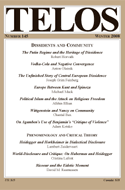Remember the streets filled with demonstrators to protest the Iraq War? Or the outrage over Gaza? Today, in the face of the repression in Iran, that camp is silent: no solidarity with democrats, no enormous gatherings in London or Paris or New York. There is a terrible calculation at stake. To support the democracy movement in Iran might imply that there is something deeply wrong with the regime in Tehran—as a previous regime in Washington understood. And that line of thought would upset the applecart of appeasement. As Iran approaches its Tiananmen moment, the righteous and politically correct are silent. The rights of people are sacrificed to the logic of diplomacy, in Iran as much as in Korea (as if they were part of an axis).
|
The protests against election fraud and the regime in Tehran recall the uprising in East Berlin, 56 years ago today. Bertolt Brecht, whose relationship to democracy was far from clear, pinpointed the hypocrisy of dictatorship in a poem worth rereading with regard to Iran. Critical Theory developed in response to the specific historical developments of twentieth-century Europe: war and revolution, the transformation of Communism into Stalinism, and the rise of Nazi Germany. Combining the legacy of German philosophical idealism with the tradition of critics of idealism—Kierkegaard, Schopenhauer, Marx, and Nietzsche—Critical Theory also built on the emergent social theory, especially Weber’s analysis of modernity and his one overriding theme, bureaucratization. For Weber, creative innovations that transform social life and that take shape especially through religious genius as charismatic prophecy succumb to the dead weight of the world: however animating the idea, however compelling the vision, its spirit flags, worn down by the inertia of life. This decline transpires, tragically, as a consequence of the efforts to implement the ideals: first comes the prophecy, then comes its management, which finally snuffs it out. This deadly logic of bureaucratization marks the fate of both capitalism and socialism; it is the institutional form of rationalization. Indeed, modernity faces two alternative threats: the stultifying embrace of bureaucratic rationalization and its opposite, the seductive irrationalism that promises fulfillment but only makes matters worse. The pessimism stereotypically associated with Adorno derives significantly from Weber’s bleak vision, the choice between charismatic dictators and anemic bureaucrats, while reserving a very small and unstable position for an objective thoughtfulness—where reason and values might momentarily coincide. It’s one thing for the Secretary of State to backpedal on human rights and refrain from making them central to U.S.–China relations. This probably accurately reflects a moderate position on rights in the Obama administration, which may be disappointing some of its supporters, especially since it’s a rollback from the rights advocacy of the Bush administration. It’s quite another, however, to find that the newly appointed Chair of the National Intelligence Council, Chas Freeman, apparently holds that the Chinese government was too lenient in its treatment of the demonstrators at Tiananmen Square in 1989. As Wajda’s film on the Katyn massacre opens, we’re reminded of how often human rights have been betrayed explicitly by their defenders. Victor Zaslavsky’s Class Cleansing: The Massacre at Katyn documents how the U.S. government knew of Soviet culpability but participated in concealing it in order to mollify its wartime ally. George Earle, previously special envoy to the Balkans, prepared a report for Roosevelt, demonstrating that the Russians had carried out the killings: Roosevelt prohibited the publication and, to get Earle out of circulation, reassigned him to American Samoa (see Zaslavsky’s account, p. 61).
|
||||
|
Telos Press Publishing · PO Box 811 · Candor, NY 13743 · Phone: 212-228-6479 Privacy Policy · Data Protection Copyright © 2024 Telos Press Publishing · All Rights Reserved |
||||
 “Community” has long been a companion of Critical Theory, but it has always pointed in two diametrically opposed directions. One path leads us to communitarian dreams of a genuine sociability and a full life. Romantic sensibility, anxious about the modern experience of cold rationality and mechanical organization, elaborates counter-models of authentic living, embedded in organic communities deemed genuine. While the Enlightenment legacy appears to abandon us to alienated isolation—no matter how much it proclaims the importance of public discourse—the romantic community provides an existential alternative, an opportunity to reclaim a human authenticity. Ferdinand Tönnies’s famous conceptual binary named this drama: the opposite of the impersonality of the modern Gesellschaft is the communal warmth of the Gemeinschaft. At stake is a choice between formal rationality and emotive solidarity, between organization and affection, between logic and love. In the envisioned community, distance can melt away, to be replaced by forms of living that are genuinely worthy of human beings.
“Community” has long been a companion of Critical Theory, but it has always pointed in two diametrically opposed directions. One path leads us to communitarian dreams of a genuine sociability and a full life. Romantic sensibility, anxious about the modern experience of cold rationality and mechanical organization, elaborates counter-models of authentic living, embedded in organic communities deemed genuine. While the Enlightenment legacy appears to abandon us to alienated isolation—no matter how much it proclaims the importance of public discourse—the romantic community provides an existential alternative, an opportunity to reclaim a human authenticity. Ferdinand Tönnies’s famous conceptual binary named this drama: the opposite of the impersonality of the modern Gesellschaft is the communal warmth of the Gemeinschaft. At stake is a choice between formal rationality and emotive solidarity, between organization and affection, between logic and love. In the envisioned community, distance can melt away, to be replaced by forms of living that are genuinely worthy of human beings. 

